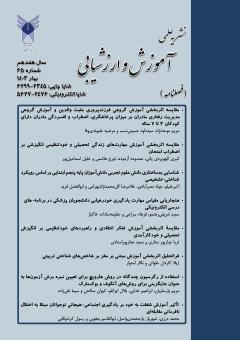مقایسه اثربخشی آموزش تفکر انتقادی و راهبردهای خودتنظیمی بر انگیزش تحصیلی و خودکارآمدی.
محورهای موضوعی : روانشناسی تربیتیثریا جبارپور ستاری 1 * , سعید نجارپور استادی 2
1 - کارشناسی ارشد روانشناسی تربیتی، دانشگاه آزاد اسلامی واحد شبستر، شبستر، ایران.
2 - استاد یار گروه روانشناسی ،دانشگاه ازاد اسلامی واحد شبستر
کلید واژه: آموزش تفکر انتقادی, راهبردهای خودتنظیمی, انگیزش تحصیلی, خودکارآمدی,
چکیده مقاله :
مقایسه اثربخشی آموزش تفکر انتقادی و راهبردهای خودتنظیمی بر انگیزش تحصیلی و خودکارآمدی هدف این پژوهش مقایسه اثربخشی آموزش تفکر انتقادی و راهبردهای خودتنظیمی بر انگیزش تحصیلی و خودکارآمدی دانش-آموزان دختر دوره دوم متوسطه تبریز بود. این پژوهش از نوع نیمه آزمایشی بود و به شکل پیش آزمون - پس آزمون-پیگیری با گروه کنترل اجرا شد. همه آزمودنیها با استفاده از ﻣﻘﻴﺎس اﻧﮕﻴﺰش ﺗﺤﺼﻴﻠﻲ واﻟﺮﻧﺪ و ﺑﻠﻴﺰ و پرسشنامه خودکارآمدی شرر، ارزیابی شدند. روش نمونهگیری هدفمند بود؛ به این صورت که از بین دانشآموزانی که نمراتشان در پرسشنامهها یک انحراف معیار پایینتر از میانگین بود، 30 نفر به صورت تصادفی در گروه های آزمایشی و 15 نفر در گروه کنترل جایگزین شدند. گروه آزمایش اول، ده جلسه نود دقیقهای، آموزش تفکر انتقادی را دریافت کرد. گروه آزمایش دوم، هشت جلسه نود دقیقهای، راهبردهای خودتنظیمی را دریافت کرد، اما گروه کنترل هیچگونه آموزشی دریافت ننمود. نتایج حاصل از تحلیل واریانس اندازه گیری مکرر بیانگر این بود که ارائه آموزش تفکر انتقادی و راهبردهای یادگیری خودتنظیمی، باعث افزایش معنیدار انگیزش تحصیلی و خودکارآمدی در دانشآموزان شده است. همچنین بین نمرات انگیزش تحصیلی و خودکارآمدی در دو گروه آموزش تفکر انتقادی و راهبردهای خودتنظیمی تفاوت معنی دار وجود نداشت. نتایج این پژوهش نشان داد که ازآموزش تفکر انتقادی و راهبردهای خودتنظیمی میتوان به عنوان روشی کارآمد برای افزایش انگیزش تحصیلی و خودکارآمدی دانشآموزان استفاده نمود.
Comparing the effectiveness of critical thinking training and self-regulation strategies on academic motivation and self-efficacy The purpose of this research was to compare the effectiveness of critical thinking training and self-regulation strategies on academic motivation and self-efficacy of female students in the second year of high school in Tabriz. This research was a semi-experimental type and was conducted in the form of pre-test-post-test-follow-up with a control group. All the subjects were evaluated using Waller and Blaise's educational motivation scale and Scherer's self-efficacy questionnaire. The sampling method was purposeful; In this way, among the students whose grades in the questionnaires were one standard deviation lower than the average, 30 people were randomly replaced in the experimental groups and 15 people in the control group. The first experimental group received ten ninety-minute sessions of critical thinking training. The second experimental group received eight 90-minute sessions of self-regulation strategies, but the control group did not receive any training. The results of repeated measurement variance analysis indicated that providing critical thinking training and self-regulation learning strategies has significantly increased academic motivation and self-efficacy in students. Also, there was no significant difference between the scores of academic motivation and self-efficacy in the two groups of critical thinking training and self-regulation strategies. The results of this research showed that teaching critical thinking and self-regulation strategies can be used as an efficient method to increase students' academic motivation and self-efficacy.

